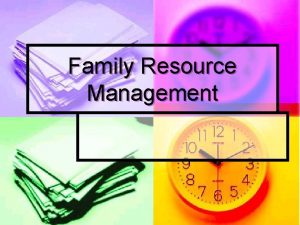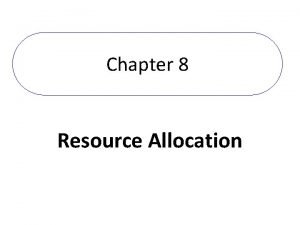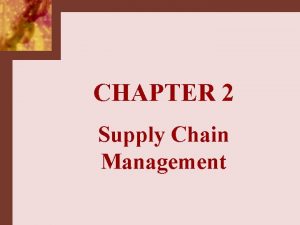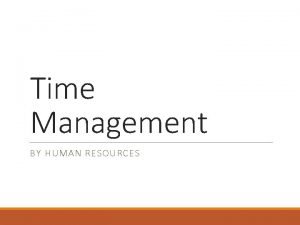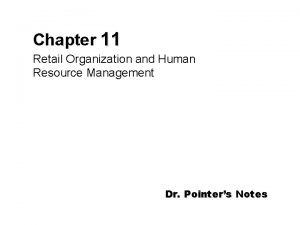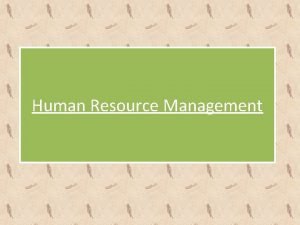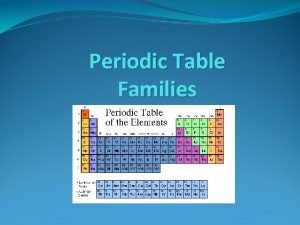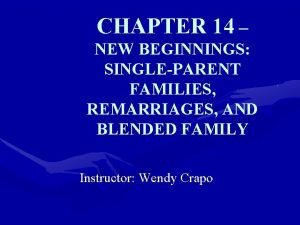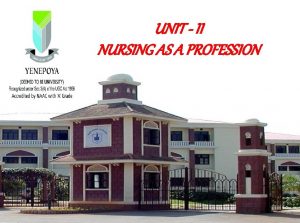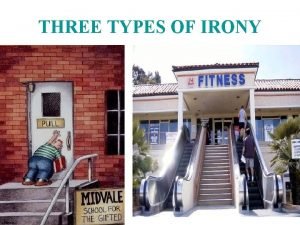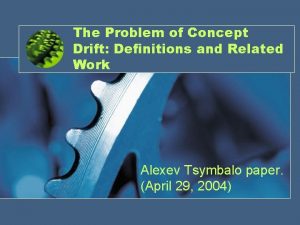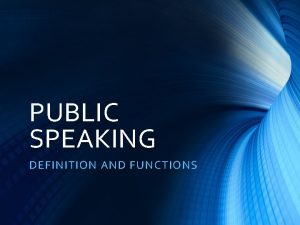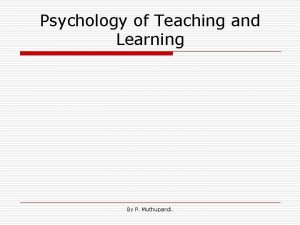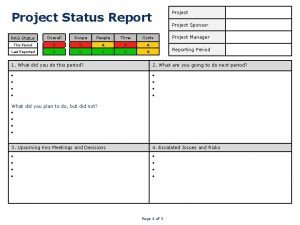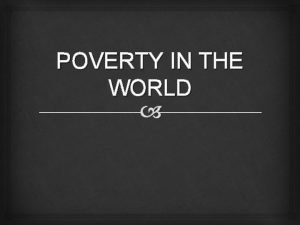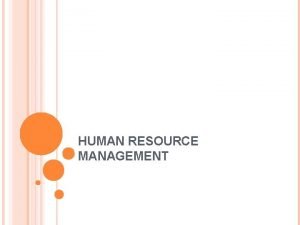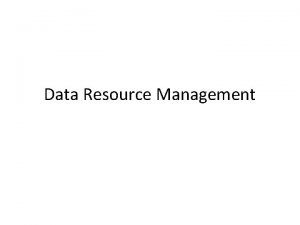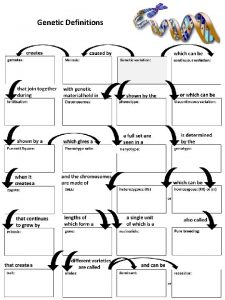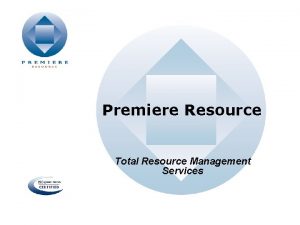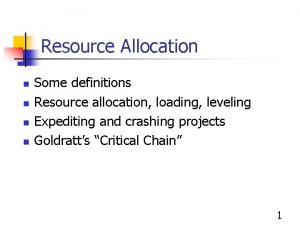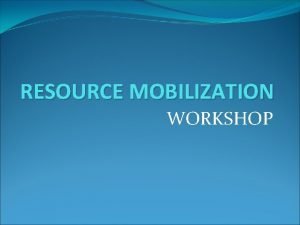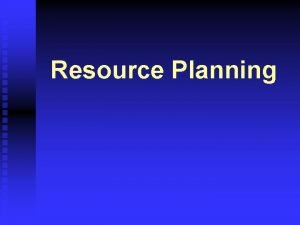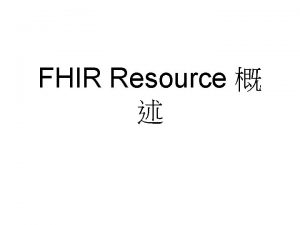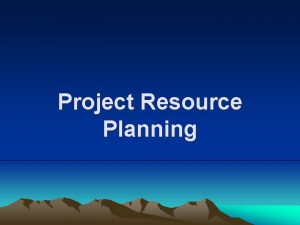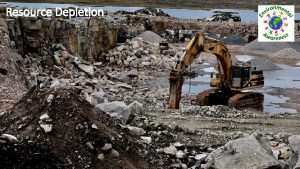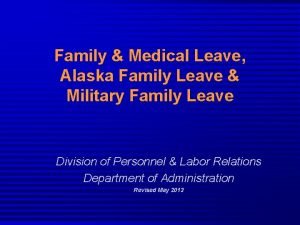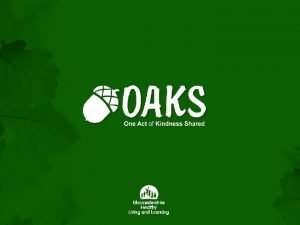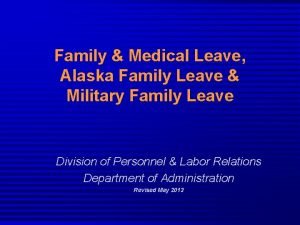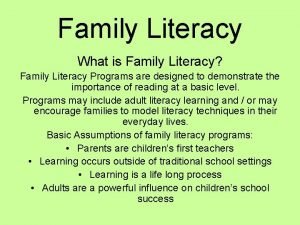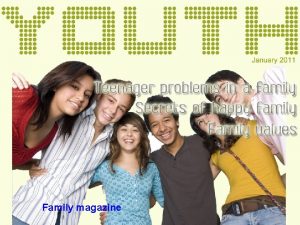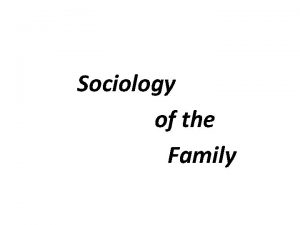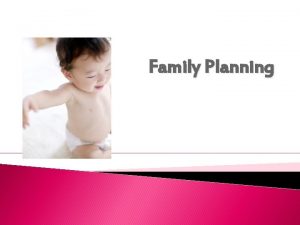Family Resource Management Definitions n n n Management























- Slides: 23

Family Resource Management

Definitions: n n n Management: running of something e. g. managing a hotel. Resources: something available to achieve a goal e. g. people, time or money. Family Resource Management: system which assists families in attaining goals by using all possible resources.

Purpose of FRM: Make wise use of resources. n Assists individuals in achieving goals. n Improve quality of family life. n

Management systems: Open system: system outside the family are used to achieve family goals e. g. educational system. n Closed system: all activities occur within the system’s boundaries e. g. amish community. n

Family as a managerial unit: n n This is an overall system. It is an open system as there is interaction between individuals and wider community. All family member may have their own goals, there needs to be agreed goals to have an effective management system. Areas that require management systems: - meal planning: decision making, shopping or cooking skills.

- money management: knowledge of budgeting, pensions or bill payment. - childcare: safety and hygiene issues and education. - conflict solving. - problem anticipation: planning for possibilities.

Components of Management: n n 3 areas: inputs, throughputs and outputs. Inputs: - Demands: needs, wants, goals or values. 1. A need is what one must have e. g. food, shelter, clothing, security, love. 2. Wants are what one would like to have e. g. expensive cars. 3. Goals are what one wants to achieve e. g. pension is long term or college or essay for Friday.

- 4. Values: beliefs of what is right or wrong e. g. vegetarian believe it is wrong to kill animals. Resources: 1. Human resources: people, time, skills. 2. Material resources: money, books, equipment.

n Throughputs: 1. Planning: - In Identify the goal - galway Gather information - colm Consider alternatives - can Consider the consequences - do Decide on action - It Identify resources

2. Organising: allocating tasks and resources to people. 3. Implementing: putting plan into action.

n Outputs: end product of inputs and throughputs. Look at: - demands and goals met i. e. did management system get results? - resources used i. e. were all resources used? - process followed i. e. was procedure followed in order?

- satisfaction i. e. is the end result good? - changes in values i. e. are there any changes in the family? - The result will be used for the future. Feedback is needed for the success of the management systems.

Decision making process: Involves: 1. Does Defining the decision 2. Gary Gathering the information 3. Call Consider the consequences 4. Daisy Decide on the solution 5. Down Draw up a plan of action 6. In Implement the plan 7. Ennis Evaluation (feedback) n

Inputs Throughputs Feedback Outputs

n Communication: Needed for any management system to work. Decision making needs communication. Need to understand the values of each family member. Discussion and communication are needed to allocate tasks for individuals. Communication is needed for evaluation for feedback for the future.

Factors affecting management: Needs, wants, goals. 2. Available resources. 3. Decision process. 4. Evaluation stage. Other Factors: n Composition of the family: - number of people in the family can affect management system. 1.

- where there may be 2 adults responsibilities may be shared. - families with a disabled person may need to be specific. n Stages in family cycle: - families with young children may have different priorities than those with teenagers.

- elderly people may have limited resources. - as child grows may have more of input into decisions. n Employment patterns: - where couple may work outside the home there may be different management system to a couple where only one works.

n - patterns of employment e. g. job sharing may impact on this. - dual earning family may have higher income than single earning family. Socio economic status: - people from different socio economic groups may have different priorities. - education viewed more important to higher socio economic group.

n - more opportunities usually for those from higher socio economic group. Management of dual role: - some families, both parents work outside the home. Dual roles e. g. homemaker and earner. - Single parent families, parent is earner and parent without support from a partner.

- parents may play dual roles. n Gender roles: - management in homes is not really affected by gender roles, more men involved in child rearing and more women work outside the home. - gender typing of certain tasks is decreasing.

n - management between family members may be rotated. Culture: - May affect management system e. g. certain rules on food. - Irish people have an emphasis on religion e. g. holy communion. - changes in culture affect management e. g. more women work outside the home.

n Values and standards: - Determine decision making. - values can change e. g. when someone is ill management system may change. - decisions can be affected by people’s concern for the environment.
 Factors affecting the management of family resources
Factors affecting the management of family resources Resource allocation vs resource leveling
Resource allocation vs resource leveling Perbedaan antara resource loading dan resource levelling
Perbedaan antara resource loading dan resource levelling Cscmp definition of supply chain management
Cscmp definition of supply chain management Objective of marketing management
Objective of marketing management Management accounting definition by cima
Management accounting definition by cima Define financial management
Define financial management Definition
Definition Time management in human resource management
Time management in human resource management Retail human resources
Retail human resources Human resources defintion
Human resources defintion Conjugal family
Conjugal family Varies from family to family on the periodic table.
Varies from family to family on the periodic table. Blended family vs binuclear
Blended family vs binuclear Nursing definition by who
Nursing definition by who Irony in julius caesar
Irony in julius caesar The problem of concept drift: definitions and related work
The problem of concept drift: definitions and related work Carburizing flame definition
Carburizing flame definition A quick primer
A quick primer Wrist rom goniometer
Wrist rom goniometer Speaker picture
Speaker picture Define education according to john dewey
Define education according to john dewey Overall rag
Overall rag Definitions of poverty
Definitions of poverty
